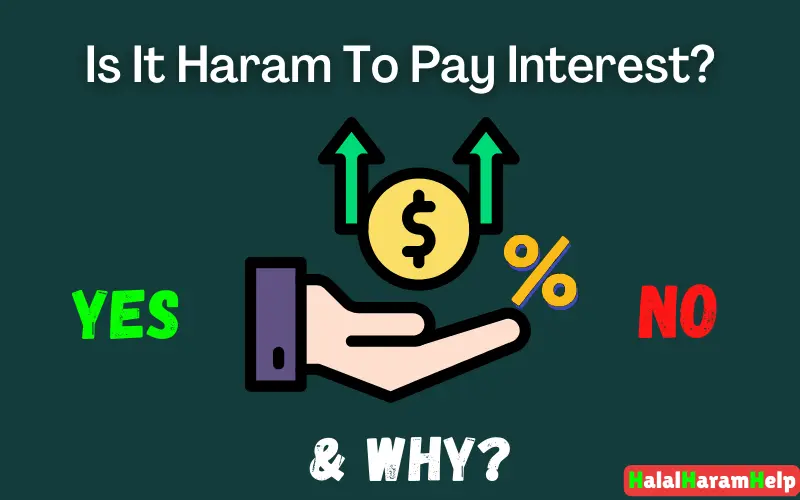Interest, a common facet of modern financial systems, poses significant ethical and religious questions for many.
In the context of Islam, the concept of interest, or “riba,” is a particularly contentious issue. Is it haram to pay interest? This question touches the core of Islamic finance and ethics, challenging Muslims to navigate their financial obligations while adhering to their faith.
This article delves into the intricacies of interest in Islamic law, exploring why it is considered haram, the interpretations of various scholars, and the implications for Muslims striving to maintain both fiscal responsibility and religious integrity.
So let’s get started.

Is It Haram To Pay Interest?
Yes, it’s completely haram in Islam to pay and get interest on anything including cars, and houses.
In Islam, paying interest is widely considered haram (forbidden), stemming from the prohibition of “riba,” an Arabic term referring to any guaranteed interest on loaned money.
This concept is deeply rooted in Islamic teachings, with numerous references in the Quran and Hadith condemning riba due to its exploitative and unjust nature.
The Quranic Perspective
The Quran addresses riba in several verses, emphasizing its prohibition and contrasting it with lawful trade.
Notably, Surah Al-Baqarah (2:275) states: “Those who consume interest cannot stand [on the Day of Resurrection] except as one stand who is being beaten by Satan into insanity. That is because they say, ‘Trade is [just] like interest.’ But Allah has permitted trade and has forbidden interest…”
This verse describes the distinction between permissible economic activities and the forbidden practice of riba.
The Hadith on Riba
The Hadith, records of the sayings and actions of the Prophet Muhammad (PBUH), also strongly condemn riba.
For instance, in Sahih Muslim, the Prophet is reported to have said: “Allah has cursed the one who consumes riba, the one who pays it, the one who witnesses it, and the one who records it.”
This Hadith highlights that all parties involved in a riba-based transaction share in the sin, reinforcing the comprehensive nature of its prohibition.
Modern Context And Challenges
In the modern world, avoiding interest can be particularly challenging due to the prevalence of interest-based financial systems.
Mortgages, student loans, credit cards, and various banking products often involve interest, posing a dilemma for practicing Muslims.
Some scholars and Islamic financial institutions have sought to address these challenges by developing interest-free financial products and services, such as Islamic banking, which operates on principles of profit and loss sharing, leasing, and joint ventures.
You might also like to learn is compound interest haram.
Tips To Avoid Interest
1. Opt for Islamic Banking: Use banks that offer Sharia-compliant products, which avoid interest by employing profit-sharing and other permissible financial structures.
2. Use Interest-Free Loans: Seek out interest-free loans from family, friends, or community organizations.
3. Save for Purchases: Instead of borrowing, saving money to make purchases outright, can help avoid the need for loans.
4. Avoid Credit Cards with Interest: Use debit cards or interest-free credit cards that comply with Islamic principles.
5. Engage in Halal Investments: Invest in assets and businesses that comply with Islamic guidelines, focusing on profit and loss sharing rather than fixed returns.
You can also know is credit card halal.
FAQs
Q: Is it haram to pay interest on a car?
A: Yes, paying interest on a car loan is considered haram in Islam because it involves riba (interest), which is prohibited.
Q: Is it haram to pay interest on a loan?
A: Yes, paying interest on any type of loan is generally haram in Islam as it involves riba, which is forbidden.
Q: Is it haram to pay interest on a house?
A: Yes, paying interest on a mortgage for a house is considered haram due to the involvement of riba.
Q: Is it haram to earn interest on savings?
A: Yes, earning interest on savings is haram because it involves receiving riba, which is prohibited in Islam.
Q. Is interest on a loan haram or halal?
A: Interest on a loan is haram in Islam, as it constitutes riba, which is explicitly forbidden.
Conclusion
In summary, paying interest is generally considered haram in Islam due to the clear prohibitions against riba in the Quran and Hadith.
The ethical and moral underpinnings of this prohibition emphasize the importance of justice, equity, and the avoidance of exploitation.
While modern financial systems present significant challenges, the development of Islamic finance offers viable alternatives for Muslims seeking to adhere to their faith while managing their financial obligations.
Understanding the reasons behind the prohibition and the available alternatives can help Muslims navigate these complexities with greater confidence and integrity.


